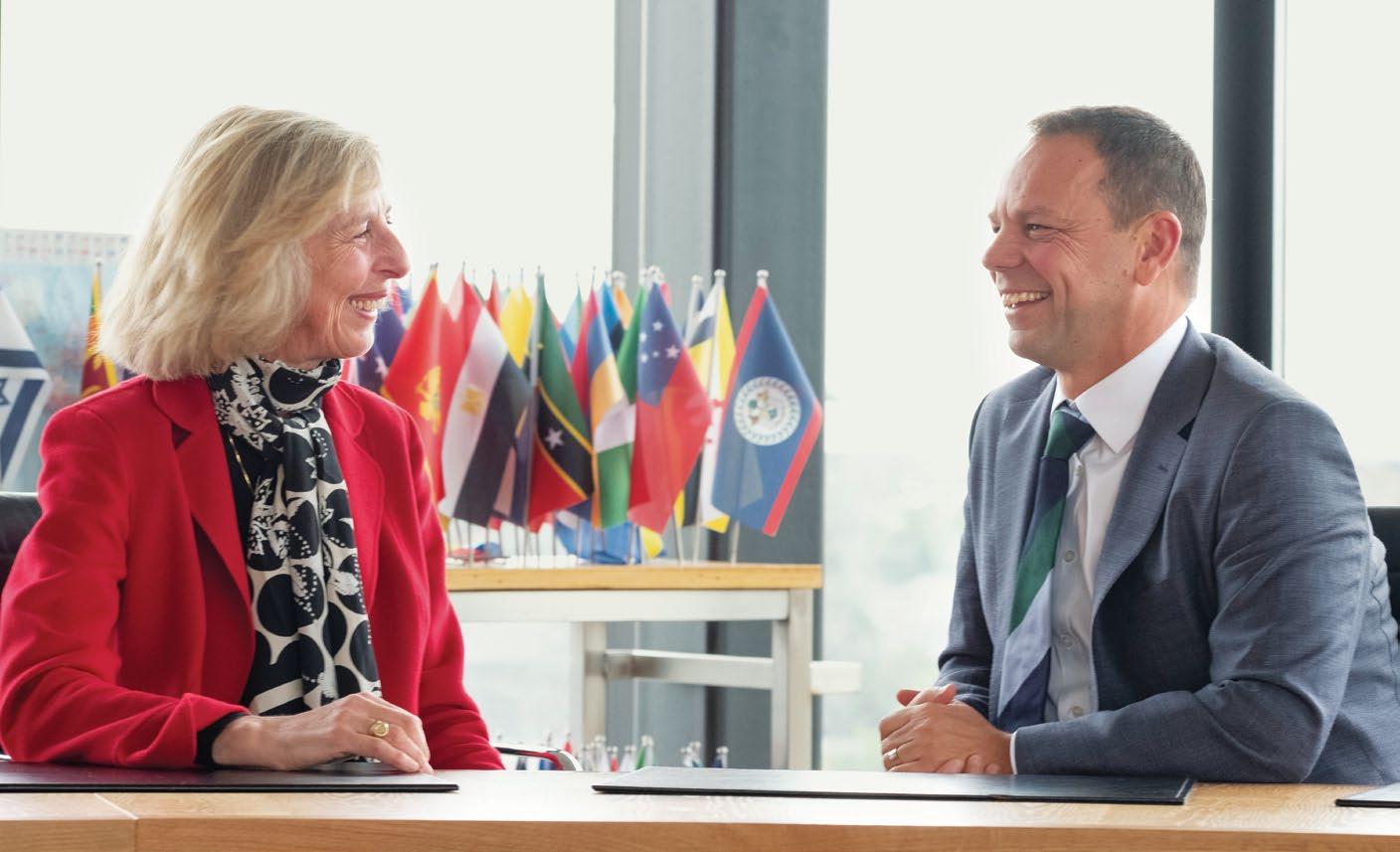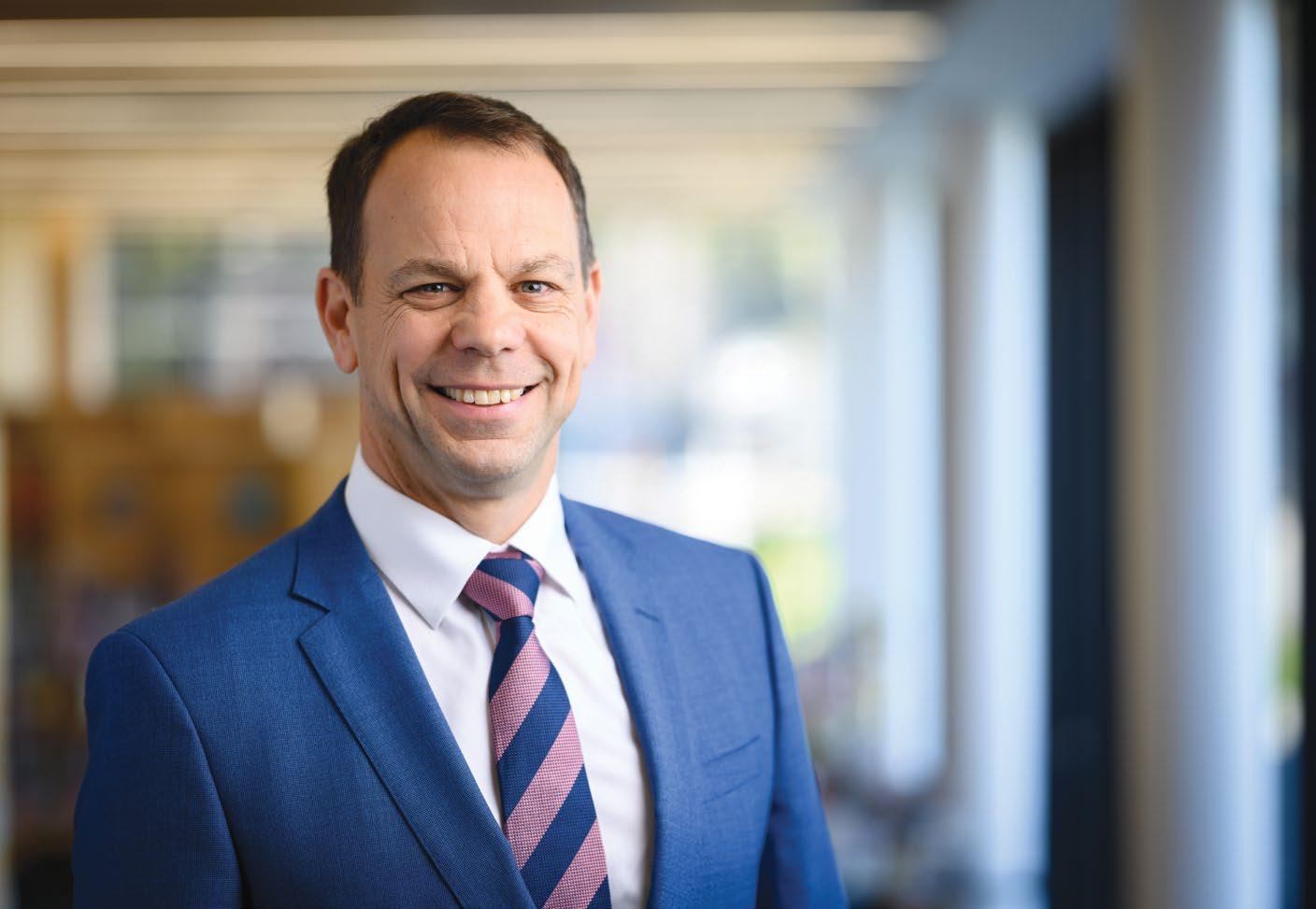
9 minute read
Carey’s new Principal: on excellence in education
from Torch Spring 2019
by CareyGrammar
Kelly Southworth Editor
In 2020, Carey will welcome its eighth Principal, Jonathan Walter. He spoke to Chair of the Board, Jane Simon, about the future of education and setting children up for success in the real world. Jane: Good morning, Jonathan. You started your teaching career at Carey in 1992 – what was it that drew you back? Jonathan: I think it’s the School’s commitment to holistic co-education that’s drawn me back to Carey. It’s the fact that we want to put an educational program in place that develops the whole child and puts them right at the heart of the experience, where we concern ourselves with their wellbeing and build safe, supportive environments for all students. It enables students to develop into the people they want to be through a range of different experiences and learning opportunities. Carey’s environment means we can support them to find who they are, and what their place is in the world. Jane: Throughout your teaching career, you have worked in several coeducational environments. What is it that appeals to you about co-education? Jonathan: To me, co-education is an obvious choice. We are in a world where boys and girls live and work together, and it seems quite artificial to segregate children and not give them the skills to collaborate, communicate and work effectively together. And we’re there to coach and guide them through those experiences. In turn, it helps students discover who they really are. Through co-education, children can find a way to connect with like-minded people and learn how to work in spaces where there is a sense of difference they can acknowledge in others. Providing a supportive environment which values diversity and individuality is really how we prepare students for the future. Jane: Thanks, Jonathan. You have worked at quite a broad range of schools, including a number of other APS schools. You’re coming to Carey from Woodleigh, which is quite a different environment. What is your transition going to look like?
Jonathan: When I first arrived at Woodleigh, people in the community were concerned that I would try to turn Woodleigh into Caulfield Grammar. But that’s clearly not the case. Woodleigh is a different community, and it supports a different group of families than Caulfield did. And similarly, the Carey community is its own community. My energy in the first part of my tenure here will be around understanding the community, learning about the amazing programs that are already in place here and getting a sense of what the hopes and aspirations of our community are and where we’re headed next. Jane: That sounds great. The relationship between the academic side of schooling with the development of the whole person is a really interesting topic. How does your own philosophy address that balance? Jonathan: I think many schools often have a quite a narrow definition of what excellence looks like in a student, and we need to broaden that. There’s certainly a place in every student’s life to aspire to be the best they can be, so we should have high expectations of all our

students, but we shouldn’t limit what we define as the important areas to excel in. I think Carey’s Positive Learning Model is a fantastic framework for this. The students who are doers, makers or creators have every right to feel that their journey through school is equally as valued as those who excel academically, as all of these strengths are incredibly important for our society going forward. There needs to be a greater emphasis placed on making sure that every child can come out of school being able to identify their strengths, feeling positive about them, and feeling empowered to make a commitment to the world and have a positive impact. Jane: Education really is evolving. How do we assist students to become equipped with future skills in this uncertain world? Jonathan: We need young people who have the capacity to solve problems without roadmaps or instructions. So we need to bring a more creative and problem-solving mindset to their educational opportunities, which is less about learning how to follow rules and regurgitate information, and more
about being able to connect with the real world. The world is changing, so we need to set up students with that capacity to relearn, reimagine, fail, bounce back, and then come up, through collaboration, with creative solutions for the future. In order to achieve this, there needs to be an important shift in education, to start valuing the outcome at the end of the school journey differently. I don’t believe we can be satisfied with just an ATAR alone any more; 15 years of education can’t be honoured by a single number. We really have to start telling a better story of what their contribution to the world could be. The academic side of education is still critical, but there is a broader set of skills which are going to keep them in a workplace and keep them evolving and being able to respond to the challenges in the future. We really do need to acknowledge that we have to get a lot better at collaboration and creative thinking. And we can teach that.

Jane: Thanks, Jonathan. It’s a very exciting time for education ahead. And it’s an exciting time for Carey with the vision you have, building on the great work that’s already been achieved over the last decade. The strength of our community is definitely one of the defining features of Carey. How important do you think community is in determining the success of the school? Jonathan: I think schools play a really unique role in society in bringing families together. They are the linkage points for our community, more so today than ever before. I believe that the school is in a partnership with its families, and a good school will really respond to their needs. In my role, it’s important for me to sense what the needs and desires, hopes and dreams of our community are, and then translate that into an educational vision. The school and its community are inseparably linked. We need to work closely together, be in touch with families, and make sure that our educational offering is something
that continues to adapt and evolve, depending on where we’re at as a community. Jane: I couldn’t agree more, Jonathan. The Carey community really embraces the idea that we all have a role to play in the development and education of our students. Jonathan: And one of the great things about a community the size of Carey’s is the breadth of opportunities it provides. It’s more than the current students and staff and families, it’s the alumni and their families that we can then reach out to. For students, the community provides a great sense of belonging that comes from finding people who share your values and interests, and then being able to connect with them. We need to branch out, to extend the boundaries of our school. I think the days of learning occurring in school alone are gone. An extended community can develop educational experiences and pathways for students which are critical in preparing them for their futures. Jane: Wonderful. Do you have role models in your own life, people you admire? Jonathan: I recently attended the Garma Festival in northeast Arnhem Land, and I met Merniwug Ganambarr, Co-Principal of the Yirrkala Homelands School in Arnhem Land. She’s worked against adversity, and pushed so diligently with grace and care to support the children at her school. At the heart of her success has been the ability to build relationships and to connect with people. At Yirrkala, they honour the past and the culture that exists in that community, and integrate the support for children to essentially live in two worlds. They have developed an educational model that enables the children to step into western culture, but not lose their 60,000-year history. I was just so inspired by the work that she’s done in incredibly difficult circumstances; her persistence, her determination to keep putting children first and the over-arching value that education is a pathway to the future for them. She has inspired me further on my journey of understanding what’s important in education. Jane: Thanks, Jonathan. I’m interested, what do you do to unwind when you’re not being the principal of a school with all the responsibilities that involves? Jonathan: My renewal comes through connecting with the natural world and spending time with my family. Whenever I can, I escape to the bush or the ocean. I kayak on the Yarra River on a Sunday morning, and I surf as much as I can, but that’s usually only in the holidays. And my family are a great source of love and support for me. My oldest daughter, Ella, is a nurse in a perinatal ward, bringing children into the world, which is truly amazing. My second daughter, Claudia, is now in first year at the University of Melbourne doing Arts and she is a fiercely determined and independent young woman, and I’m sure she’s going to make a huge impact on the world. And my son, Digby, in Year 11 is a completely passionate dramatist, dancer and singer. It’s great to see him connecting with his passion, finding a creative energy within himself and sharing his talents with the world. I’m married to Claire, who is an educator as well. She’s an enormous support to me in my role as Principal. I’m fortunate to not only benefit from her love and support, but also her amazing educational brain. She really understands the best way to connect with students. Jane: We very much look forward to meeting your family, Jonathan. I’m sure the Carey community will enjoy engaging with them when you start here as Principal in 2020. Thank you very much for talking with me this morning and thank you for the enthusiasm you’re bringing to your role. Jonathan: Thank you Jane. It’s a delight to be back and I’m very much looking forward to my time here starting in January.










